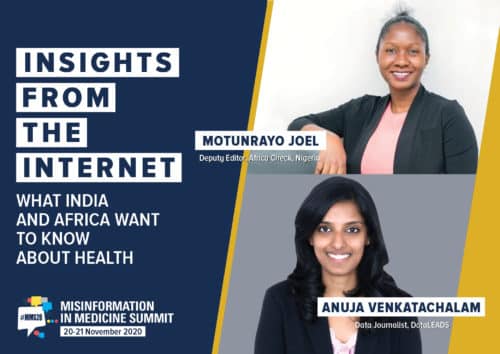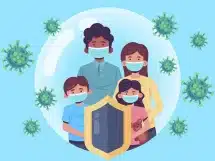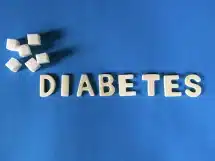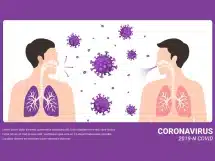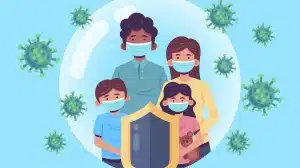Tracking Google Search trends reveal a lot about the pandemic. Such data also reveals the public perception of the disease. Journalists from Africa and India teamed up for a session to share insights from the internet at the Misinformation in Medicine Summit 2020.
By Anuja Venkatachalam
What can internet searches tell us about COVID-19? In April 2020, media organisations Africa Check, DataLEADS, and BOOM partnered with Google Search to use online search data to identify and fact-check harmful vectors of misinformation related to COVID-19.
Journalists Motunrayo Joel, Deputy Editor at Africa Check, Nigeria, and Anuja Venkatachalam, Data Journalist at DataLEADS shared insights from the internet at the “Misinformation in Medicine Summit” on 20th November 2020 organised by DataLEADS in partnership with Google News Initiative, Global Investigative Journalism Network, Judith Neilson Institute, Australia India Institute, and Konrad-Adenauer-Stiftung.
In India, Google received a slew of questions on self-medicating to prevent or treat coronavirus infections. Analyses conducted by DataLEADS revealed that these medicines were either prescribed for the treatment of cardiac diseases, high blood pressure, and stomach ulcers, available over-the-counter for flu-like symptoms, or covered in mainstream media for being potential medications for COVID-19.
The more dangerous vectors of misinformation were related to the direct consumption of sanitizers and disinfectants that are easily available. Sodium hypochlorite, alcohol, soap, and titanium dioxide methylxanthine were searched for internal consumption to treat coronavirus.
Internet searches also showed religious profiling following the Tablighi Jamaat cluster of infections, with users filing questions such as, “Why do more Muslims have COVID-19?”, “How many Muslims in India are infected with COVID-19?”, and “How many Muslim countries are affected by coronavirus?”.
In Nigeria, however, herbal cures were the most popular category of questions related to COVID-19. People wanted to know about the effectiveness of bitter gourd, a combination of lime and bicarbonate soda, banana, ginger, garlic, and palm oil in treating coronavirus infections.
Their data also showed that symptoms such as rashes, loss of smell and taste, and testing positive without necessarily developing a fever were popularly searched for online before they were formally addressed by the World Health Organisation and local health bodies.
Africa Check and DataLEADS have now extended their monitoring of de-identified search data to other diseases. They are finding that such analyses reveal the public perception of diseases, particularly in the case of mental illnesses and diseases that have a strong social stigma in countries such as India and Nigeria. Depression, for example, is often perceived as “bad luck”, and non-infectious diseases such as asthma are misperceived as being infectious.
DataLEADS has collaborated with medical professionals to release public awareness materials that will fact-check popularly searched questions about diseases such as asthma, cardiology, depression, stress, and tuberculosis.
You can watch the recording of the session here.



